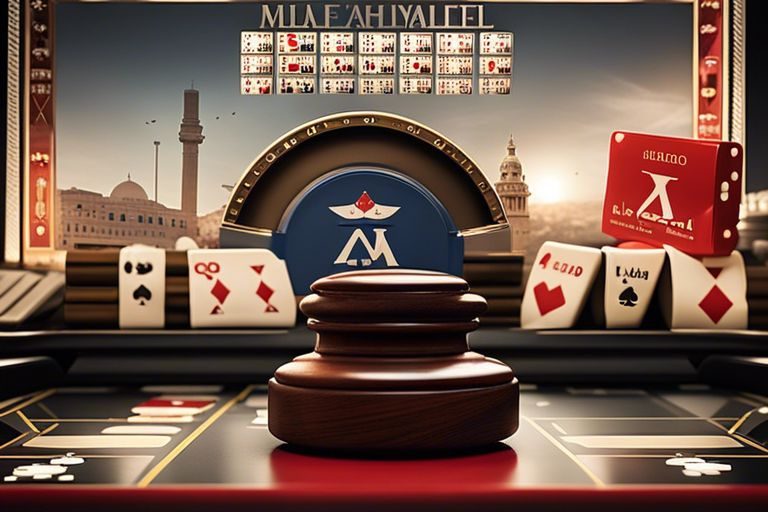Malta’s Gaming Laws for Newbies

Most newcomers to the world of online gaming may find themselves overwhelmed by the complex legal landscape of Malta, one of the leading jurisdictions for gaming regulation. Understanding the key laws and regulations governing the industry is vital to operate within compliance and avoid hefty penalties. In this blog post, we will break down the important aspects of Malta’s gaming laws, shedding light on the critical information every newcomer needs to know.
The History and Evolution of Malta's Gaming Laws
Early Regulations
The regulation of gambling activities in Malta dates back to the 1920s with the introduction of the Public Lotto Ordinance. This law aimed to control and manage lotto games to prevent fraud and ensure fairness. Subsequent legislations were enacted over the years to address different forms of gambling, such as casinos and betting houses.
The Malta Gaming Authority (MGA)
Gaming laws in Malta underwent a significant transformation with the establishment of the Malta Gaming Authority (MGA) in 2001. The MGA serves as the regulatory body responsible for overseeing all forms of gaming in Malta, including online gaming, casinos, lotteries, and betting. The MGA is known for its stringent regulatory standards and has been instrumental in positioning Malta as a reputable jurisdiction in the global gaming industry.
To ensure compliance with regulatory requirements, the MGA regularly conducts audits and inspections of gaming operators. Any deviations or non-compliance with the regulations can result in severe penalties, including fines or revocation of licenses. Gaming operators licensed by the MGA benefit from access to the European market, as Malta is a member of the European Union. This provides a competitive advantage and signifies trustworthiness to players and business partners.
Types of Gaming Licenses in Malta
One of the key attractions of Malta for companies in the gaming industry is its well-established and respected regulatory framework. The Malta Gaming Authority (MGA) offers various types of licenses to cater to the diverse needs of operators in the sector. Gaming licenses in Malta are categorized into two main types: Business to Business (B2B) licenses and Business to Consumer (B2C) licenses.
| Type of License | Description |
| B2B (Business to Business) Licenses | For operators providing services or supplies to other gaming companies. |
| B2C (Business to Consumer) Licenses | For operators offering gaming services directly to consumers. |
B2B (Business to Business) Licenses
With the B2B license in Malta, companies can legally provide gaming services to other licensed operators. This type of license is necessary for software providers, payment processors, and other service providers in the gaming industry. The MGA regulates B2B providers to ensure that they meet the necessary standards of integrity, fairness, and security.
B2C (Business to Consumer) Licenses
Licenses for B2C operations are granted to companies that offer gaming services directly to consumers. These licenses cover various types of betting activities, including casino games, sports betting, poker, and more. Businesses holding B2C licenses must comply with strict regulations regarding player protection, responsible gaming, and anti-money laundering measures to ensure a safe and fair gaming environment for their customers.
Key Legislation Affecting the Gaming Sector
The Gaming Act
Many new entrants to the iGaming industry may feel overwhelmed by the legal complexities surrounding Malta’s gaming laws. The Gaming Act, also known as the Remote Gaming Regulations, serves as the primary legislation governing the sector. Enacted in 2004 and amended in 2018, this comprehensive law outlines the licensing requirements, duties of operators, player protection measures, and penalties for non-compliance.
Secondary Legislation and Directives
With the Gaming Act as the foundation, secondary legislation and directives further shape the regulatory framework in Malta’s gaming industry. These include various legal notices, regulations, guidelines, and directives issued by the Malta Gaming Authority (MGA) to ensure compliance with EU standards and best practices. These supplementary laws cover areas such as anti-money laundering procedures, technical standards, responsible gaming initiatives, and advertising guidelines.
Legislation affecting the gaming sector in Malta is designed to maintain a fair, responsible, and transparent gaming environment. Compliance with these laws is crucial for operators to avoid severe penalties, including fines, license suspension, or revocation. It is crucial for newbies and established operators alike to stay updated on the evolving regulatory landscape and adhere to the strict requirements set forth by the authorities.
Directives from the EU and the MGA play a vital role in enhancing consumer protection, preventing money laundering, and promoting responsible gaming practices. These directives often require operators to implement robust mechanisms for age verification, self-exclusion tools, and reporting of suspicious activities. By following these directives, operators can demonstrate their commitment to integrity and ethics in the gaming industry.
Licensing Process and Requirements
Application Procedure
For those looking to enter the online gaming industry in Malta, obtaining the necessary licenses is a crucial step. An applicant must submit a detailed application to the Malta Gaming Authority (MGA), including all relevant documentation and information. The application process involves thorough scrutiny by the MGA to ensure that the applicant meets all the legal requirements and standards set forth by the Gaming Act.
Compliance Obligations
Compliance with Malta’s gaming laws is non-negotiable for license holders. License holders must adhere to strict regulations and guidelines to ensure player protection, responsible gaming practices, and anti-money laundering measures. Failure to comply with these obligations can result in severe penalties, including fines, suspension, or revocation of the license. It is crucial for operators to have robust compliance measures in place and to stay updated on any changes in the regulatory framework.
Compliance with Malta’s gaming laws is non-negotiable for license holders. The MGA conducts regular audits and inspections to ensure that operators are meeting their obligations and maintaining the highest standards of integrity and transparency. By prioritizing compliance, operators can build trust with both regulators and players, ultimately contributing to a sustainable and reputable gaming industry in Malta.
Taxation and Financial Incentives
After setting up a gaming company in Malta, it is crucial to understand the taxation and financial incentives that apply to this sector. The Maltese government has established a transparent and business-friendly tax regime, making the country an attractive destination for gaming operators and investors.
Tax Rates for Gaming Companies
Companies operating in the gaming industry in Malta are subject to a corporate tax rate of 35%. However, Malta operates a full imputation system, which means that shareholders are entitled to claim a tax refund on the distribution of dividends. This can result in an effective tax rate of 5% in certain cases, making Malta one of the most competitive jurisdictions in Europe for gaming companies.
Incentives for Operators and Investors
For those looking to establish a presence in Malta’s gaming industry, there are several financial incentives available. Qualified companies can benefit from various tax credits, including the highly sought-after Notional Interest Deduction (NID). The NID allows companies to deduct a deemed interest on equity from their taxable income, effectively reducing their tax liability. Additionally, there are also opportunities for tax deductions on qualifying intellectual property assets, further enhancing the overall tax efficiency for gaming operators and investors.
For instance, companies setting up their gaming operations in Malta can negotiate advantageous tax rulings with the Maltese tax authorities to tailor the tax incentives to their specific business structure and needs. This level of flexibility and customization enables companies to optimize their tax position while complying with Malta’s regulatory requirements.
Player Protection and Responsible Gaming
Consumer Protection Laws
Player protection is a top priority in Malta’s gaming laws. Consumer Protection Laws are in place to safeguard players’ rights and ensure fair treatment in online gaming. These laws require operators to provide transparent terms and conditions, protect players’ personal information, and handle complaints effectively.
Responsible Gaming Measures
An imperative component of Malta’s gaming regulations is the implementation of Responsible Gaming Measures. These measures aim to prevent and address problem gambling by promoting responsible gaming practices. Operators are required to offer tools for players to set limits on their gaming activities, provide access to resources for those who need help with gambling addiction, and ensure underage individuals are not able to participate in online gaming.
This proactive approach to responsible gaming is crucial in the online gaming industry, where accessibility and convenience can sometimes lead to issues such as addiction. Operators must comply with these measures to foster a safe and enjoyable gaming environment for players.
Anti-Money Laundering (AML) and Other Regulatory Provisions
Despite the relatively small size of Malta, it has established itself as a prominent jurisdiction for online gaming operators. One crucial aspect that has attributed to its success is the robust regulatory framework in place, particularly concerning anti-money laundering (AML) measures. The Malta Gaming Authority (MGA) enforces stringent AML regulations to prevent criminal activities such as money laundering and terrorist financing within the gaming industry.
AML Requirements for Gaming Operators
One of the primary AML requirements for gaming operators in Malta is the implementation of customer due diligence (CDD) measures. This involves thorough verification of the identity of players, monitoring of transactions, and reporting any suspicious activities to the authorities. Additionally, operators are required to maintain accurate records of all transactions and player information to ensure transparency and traceability.
International Cooperation and Compliance
To ensure international cooperation and compliance with AML regulations, Malta actively participates in various initiatives and organizations dedicated to combating money laundering. The country is a member of the Financial Action Task Force (FATF), an intergovernmental body that sets international standards for combating money laundering and terrorist financing. By aligning its regulations with international best practices, Malta strengthens its position as a reputable and trustworthy gaming jurisdiction.
Provisions related to international cooperation and compliance play a significant role in maintaining the integrity of Malta’s gaming industry. By collaborating with other countries and organizations, Malta can exchange information, best practices, and intelligence to prevent cross-border money laundering activities. This proactive approach not only safeguards the reputation of Malta but also enhances the overall credibility and trustworthiness of its gaming operators.
Navigating Online Gaming Regulations
Not understanding Malta’s gaming laws can be a daunting task for newcomers in the industry. However, with the right guidance, navigating through the online gaming regulations can become more manageable.
Online Gaming Licensing
Gaming operators looking to establish their business in Malta must adhere to strict licensing requirements set by the Malta Gaming Authority (MGA). The MGA is responsible for overseeing all online gaming activities in the country, ensuring that operators comply with regulations to protect players and maintain the integrity of the industry. Obtaining a gaming license from the MGA involves a thorough application process, including background checks, financial audits, and compliance assessments. It is vital for operators to understand the licensing process to avoid any legal issues and operate within the boundaries of the law.
Online Gaming Laws and Jurisdictional Challenges
Laws governing online gaming in Malta are constantly evolving to keep up with technological advancements and industry developments. One of the most significant challenges for online gaming operators is navigating the complex web of international laws and jurisdictional issues. The global nature of online gaming means that operators may face legal challenges in multiple jurisdictions, requiring them to seek legal counsel to ensure compliance with local regulations. Understanding the legal landscape and staying updated on regulatory changes is crucial for operators to avoid potential legal pitfalls and maintain a successful business operation.
The region’s reputation as a hub for online gaming has attracted operators from around the world, drawn to Malta’s favorable tax incentives and regulatory framework. By complying with Malta’s gaming laws and industry standards, operators can benefit from a transparent and well-regulated gaming environment, gaining the trust and loyalty of players and stakeholders.
Conclusion
Following this guide, newbies in the gaming industry should now have a clearer understanding of Malta’s gaming laws. By breaking down the key regulations and providing explanations in a simplified manner, this article aims to demystify the complexities surrounding gaming laws in Malta. It is crucial for operators, affiliates, and other stakeholders to grasp these laws to ensure compliance and successful operations within the Maltese jurisdiction.
For newbies looking to navigate the world of online gaming, understanding Malta’s regulatory landscape is crucial. By staying informed and seeking legal advice when needed, aspiring gaming entrepreneurs can confidently navigate the legal requirements and establish compliant and successful businesses in Malta.
FAQs:
What is the Malta Gaming Authority (MGA), and what role does it play in regulating the gaming industry?
The MGA is the regulatory body responsible for overseeing all forms of gaming in Malta, including online gaming, casinos, lotteries, and betting. It ensures compliance with regulatory standards through audits and inspections.
What types of gaming licenses does Malta offer, and how do they differ?
Malta offers Business to Business (B2B) licenses for service providers and Business to Consumer (B2C) licenses for companies offering gaming services directly to consumers.
What are the key components of Malta’s gaming laws, and why is compliance essential?
Malta’s gaming laws cover licensing requirements, player protection, responsible gaming, taxation, and anti-money laundering measures. Compliance is vital to avoid penalties and operate within legal boundaries.
How does Malta’s tax regime benefit gaming companies, and what financial incentives are available?
Malta offers a competitive corporate tax rate and incentives such as the Notional Interest Deduction (NID) to gaming companies, enhancing their tax efficiency and attractiveness for investors.
What measures does Malta implement to promote responsible gaming and prevent money laundering?
Malta enforces strict regulations on responsible gaming, including player protection laws and anti-money laundering measures, to ensure a safe and transparent gaming environment.
Recommended Posts

Financial Aspects of Doing Business in Malta
July 26, 2024

Buffalo’s Wealth Slot Game by 1spin4win
July 26, 2024





